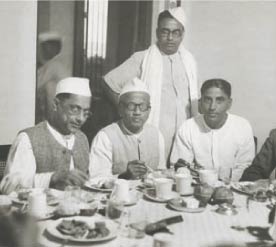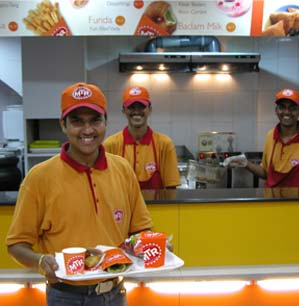Reservations : Please Not Again
The central government has decided to introduce a quota for other backward classes in the higher-education institutes funded by it. The institutes will include the IITs, IIMs, NITs and 20 central universities, including DU.
Why suddenly out of the blues the politicians come up with an idea to re-implement or re-introduce that draconian mandal tactics ? The government is here referring to OBC’s when they say backward classes,when infact they are not backward.They are labelled as the "creamy layer".The reason is simple its vote bank politics.The overall reservation in central government-funded educational institutions will go up from the current 22.5 (for SC and ST students) to 49.5 per cent (this includes OBC’s now),if it is legislated in our parliament.But I feel any educated and enlightened Indian may s/he be from any class/caste/group will never want this unfortunate idea to see the light of the day.
 I read this edition of "Outlook" magazine which mentions neatly that the group to whom the Govt refers to as OBC’s are actually well off in the Indian society today. Moreso many of the educated ones from the so called lower class who have benefitted from this system so far don’t want their kids to follow the same path.
I read this edition of "Outlook" magazine which mentions neatly that the group to whom the Govt refers to as OBC’s are actually well off in the Indian society today. Moreso many of the educated ones from the so called lower class who have benefitted from this system so far don’t want their kids to follow the same path.A small background to this stupid principle.Indian society had a system called caste, that divided the society based on the type of labor. Some form of labor was considered better than others and so the division of labor became a tool of inequality. Slowly, the caste system became worse enough to prevent social ability and people were decided by birth, on what type of occupation they can perform. It was terribly unfair and social thinkers sought out to remove the stale practices resulting out of this bad principle. So, there were attempts to bridge this unfair treatment. So far so good.But, what happened after Independence was that there was policy to reserve specific proportion of seats in academic institutions for these backward sections of the society. The Constitution envisaged special employment privileges for these backward sections of the society for a period of 10 years starting from 1950, but these have been extended regularly since.And our mantriji’s and neta babu’s have used it to the best of their benefits to incite the sensitive Indians.
What has 50 years of reservations achieved in India ? The well-healed among the reserved catagories make maximum use of the reservation.
It was fortunate that,India started to embrace globalisation since 1990's which unexpectedly countered this horrible practice a bit. By bringing in more jobs and insitutions, people of forward castes could progress and within a decade the suppressed group progressed really well. Given the low reservation in the national elite insitutions such as IITs,IIMs,NITs the nation prospered and India became a great growing nation. But, the government now wants to murder the very heart of the system that brought India out of its shabby past. India's elite academic institutions and private corporations, who arteried this great revolution by mitigating reservation, are under target. They are to be forced into reservation. The cruel tools that killed India in the first 44 years of its deadly past are to be used again.
By focusing on reservation, it will lead to a fall in India’s standing world wide. India will no longer be the hub of trained and skilled manpower. This will have long term repercussions on the economy as well. These reservations will also lead to more "Brain Drain".That’s for sure,in the last two or three years,India has been fortunate to see the "Reverse Brain Drain",this will come to a full stop.I read a recent edition of "India Today" which mentions that among the present day youth around 82% see India as their destination to work and live life and this is huge number compared to what was 5 years back when heading to the US shores or the western world for the educated and brightest was a norm.
If you have chanced to read Ayn Rand's "Atlas Shrugged" (try that book). There are some group of hard working innovators who built this nation and the remaining are a large majority of leechers who want to lick their hard-earned efforts. The successes of innovators are going to be used as weapons against them.
In my opinion opinion reservations are wrong for the following reasons:
1.Admission to the IITs,IIMs and NIT’s are extremely tough and anyone who has gone through the process knows what I am mentioning to. No reward for meritorious students as students work tirelessly for years at a time. After the blood, sweat and tears and burning the midnight oil, they see their goal snatched away,right in front of them. Now if almost half of the students are going to come through some reservation,then will it not impact the schools in some way. I don’t doubt the credibility of the students from the backward class as I am not person to do that. But I do have some statistics which clearly goes on to prove that this reservation logic doesn’t work. I graduated from Karnataka Regional Engineering College,Surathkal now known as NITK in 2002 and for all engineering schools in India,AICTE has set certain time frames for completing B.Tech degrees.This is set to a maximum time frame of 8 years and even today few of my batchmates from the reserved class have not passed yet. This was not with my batch but this is a recurring issue and is common across all batches. The number is less (4 to 5 for a batch of 300 ). So has the purpose been served, I don’t think so.
Its not only institutes of repute, the Govt is pushing for reservation in private sector also. Now since the private sector is booming, reservation will attract that much more votes. Mantri babu’s I can see the motive behind all this.
2.The reservations throws out a negative signal indicating that weaker sections are incapable of passing such an exam without the quota system. Almost as if the general category is intellectually "superior" to the others. A person’s intelligence needs to be nurtured and developed in the right direction. It is a long and gradual process and begins from an early age, not at college. The Govt,I feel is acting in the opposite direction, following the top-down approach instead of following the bottom-up approach.If the government really cared for the poor and socially backward,it would work towards an all round development of the education at the grass root level first and make primary education accessible to all.The primary and secondary education system in the rural India is in a mess. Reservations at a higher level education is not going to help if the primary and secondary levels are not strong. Its like I am dreaming about a strong tree when my roots are not strong and firm. Take this example.
"There are lot many jobs available in rural and middle segment towns in India in schools and colleges. Even after giving extra incentives and reservation quotas these posts are not getting filled and the Govt wants to change the IITs/IIMs/NITs." First complete your grass root level work then look upwards,mantrijis.
Another flavour of reservation which I have witnessed myself is reservation of seats in Engineering schools by the State Government. In this case it was Orissa Govt but I am told this rule is prevalent in few other states. As far as Orissa is concerned this rule was introduced to make sure that more and more women come forward and be a part of the society reformation program once they graduate from these schools.The brain child of this so called innovative program was Biju Patnaik,the erstwhile chief minister in 1994. Has that served the purpose I don’t think so. The state of affairs have not improved much and to me it was a political gimmick that time,which the later generations have to accept as a norm.
On the contrary,these reservations shows a negative image about the female candidates that they are not as capable as their male counterparts. At times it shows that the male candidates are "superior",mentally and intellectually more smarter as compared to the females. But in reality its not so. If we are a nation where men and women are to be given equal opportunities lets make same rule for one and all.This will have a positive result as it would never make the females realise that they have earned their degree with less effort or that they lack the mental acumen.Why should we make them feel that,they are less capable by offering reservation at the first instance.
To cite an example,I have a cousin sister Rosy,who graduated from NIT Rourkela and then after having worked in Infosys for some time,she made it into SP Jain Institute of Management. She had taken up the women’s reservation facility,8 years back but to my understanding it was a decision driven more by the society than by herself. I know her and know that she was and is highly capable to make it to any good school but then why did she use that. The answer is simple : If something is given to you for free and also if the Indian mindset treasures engineers and doctors as the only respected professionals, then this is logical outcome.She simply followed to what society accepts as the natural accepted practise but heart in heart when I talk to her, she herself expresses, this is not the right way things should move.That self-realisation is in itself a great change but how many people consciously do that. Few rather very few.
3.People who don’t actually belong to the weaker sections often take up the seats through the quota system. This is done by easily obtaining fake caste certificates as cases of these are rampant during the admission season. SC/ST/OBC status should not be hereditary- which would imply that if a person has availed of the reservation during his lifetime, his children should not be allowed to benefit as well because that is misusing the provision available. If the above proposal had been implemented successfully, then the number of SC/ST/OBCs would have reduced or remained constant, thereby leading to reduction in reservations. However, the opposite is happening,the need for reservations is increasing. Is my logic or my thought process in-correct ? Correct me if I am wrong. In the 1950’s this system was implemented for the upliftment of the weaker sections of the society,so logically speaking today after 55 years of its enforcement, there should have been improvement and the percentage of reservation allocated should come down. But it’s increasing. Why ?
Assume for a moment that the new reservation is implemented . Do do feel there will be any change . NO NO NO is my answer and the wrong will continue.

In a nutshell, the existing premier institutions should be left untouched and institutions should be set up which focus more on weaker sections of society, in addition to strengthening the primary and secondary educational infrastructure for these sections. It was 16 years ago, when Rajeev Goswami set himself on fire-many other individuals did the same. Slogans were raised, blood was spilt, bodies were burnt. Yet the Government chose not to pay any heed to the frustration and anger of those people. Their ignorance seems to have grown over the years and we are now ready for Mandal Part II.It is about time we realized that we should not be afraid to question our Government,and the Government should not be afraid of being accountable to the people.
After all we are not here to accept to the whims and fancies of "Arjun Singh". Raise your voice and let this malady not ruin you,me and this nation above all.
(Note : None of the comments in this blog is intented to hurt or incite any person/institution/company. These are my personal opinion and views.)
Keep reading and remain connected.




